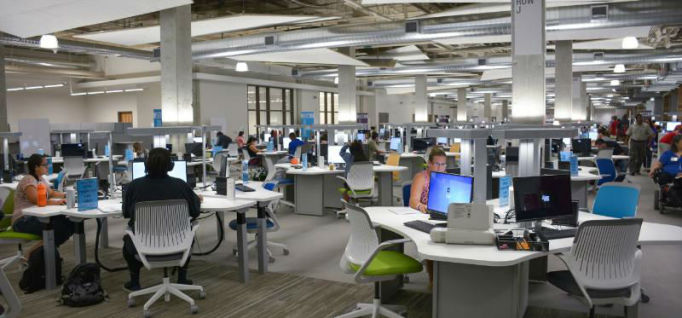A ‘New Breed’ of Remedial Math Education
By Heather Boerner
October 10, 2014
Math emporium offers a new model for helping students prepare for the rigors of college-level mathematics.
Remedial education, particularly remedial math education, remains one of the biggest, most persistent stumbling blocks for entering college students in search of higher education.
Try as they might, educators have struggled to develop a system that promises to get students up to speed on college-level math concepts. Continued struggles often knock students off course.
A budding partnership between Austin Community College (ACC) and McGraw-Hill looks to change all that. Announced at the 2014 EDUCAUSE Annual Conference in Orlando last month, the math emporium boasts access to 600 individual learning stations where students can receive individualized instruction focused on specific areas of need.
Such reforms have become urgent in states such as Texas, where lawmakers have passed legislation more closely tying community college funding to student performance.
Historically fewer than half of ACC’s remedial math students completed the college’s three-semester remedial program.
Program administrators say the emporium, part of the college’s high-tech ACCelerator lab, will enable students to advance more quickly into for-credit education, upping the chances that participating students go on to achieve their academic goals.
“We can’t afford not to be successful when the percentage of students who are not persisting through remedial math and going on to success is so high,” says Stacey Guney, director of the ACCelerator program.
Partner resources
Through its partnership with McGraw-Hill, the college integrated the publisher’s technology-based ALEKS adaptive education program, which helps each student target specific concepts or areas of reform.
The emporium essentially eliminates ACC’s three-semester remedial education model, replacing it with a single 16-week course featuring 12 different learning objectives — four objectives for each semester. A knowledge assessment lets students and instructors know exactly where students stand on each objective.
As students work through the program, they’re notified when they achieve an objective at 90 percent mastery. That’s higher than the C-average, or 70 percent mastery, students were required to achieve as part of ACC’s traditional remedial education program. The system also allows instructors to monitor progress, noting when students have trouble with a particular topic so that they can step in to provide additional help.
Total redesign
To Guney, the emporium is more than just another technology-enhanced mathematics program; it’s a completely new way of delivering developmental education.
“The feeling here is that things are just different,” she says of the program, noting that the emporium “doesn’t look, feel, smell, or act like a classroom in the traditional sense.”
When students walk into the ACCelerator lab, built in an old JC Penney near campus, there are no rows of desks or separate rooms. What walls there are are made of glass. Staff members, instructors and remedial math tutors patrol the open space in red shirts or vests. Twenty-three remedial math instructors hold class in two, shorter weekly sessions or in one long session on the weekends.
Educators don’t stand up in front of students and lecture. Rather they spend the majority of their time reacting to what the students — and ALEKS — tell them. Educators also meet individually with students to discuss their progress and offer access to tutoring where more remediation is needed.
By the numbers
So far, the approach is working. In the first month of the emporium, 92 percent of students passed objective one; 33 percent passed objective two, and 28 percent passed objective three. Twelve percent of students completed the entire first semester, mastering all four objectives.
At the end of the 16-week course, administrators will review completion rates and decide if the program is worth expanding.
The goal, says Guney, is to eliminate any excuse for failure.
“Some students have mastered the art of being invisible and sitting in the back of the class,” she says. “There is no back of the class here.”
How does your college approach remedial education? Tell us in the Comments.












